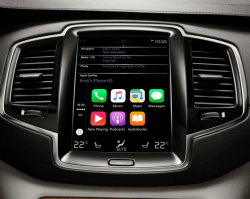
— According to a new study conducted to evaluate driver distractions, using an infotainment system is more distracting than driving drunk or high on weed.
And in the case of reaction times while driving, researchers found using an infotainment system is five times worse than driving drunk.
The study follows other research performed to learn how infotainment systems create serious safety hazards while driving.
In one study from the AAA Foundation for Traffic Safety in 2018, researchers learned that messing with the infotainment system demanded as much attention from the driver as balancing a checkbook.
The latest research was commissioned by the UK’s largest independent road safety charity, IAM RoadSmart, and performed by Transport Research Laboratory.
In what they call "worrying results," researchers determined reaction times while driving highway speeds increased average stopping distances to between four and five car lengths.
Additionally, drivers took their eyes off the road for as long as 16 seconds while driving, and using touch controls caused reaction times worse than texting while driving.
The test consisted of a driver not using the infotainment system, then driving by using voice controls for the system, and finally the driver interacted with the infotainment system by touching it.
Both voice and touch controls significantly distracted the drivers, but using the touchscreen was the most distracting. This is bad news because most driving participants said they used touch controls more than voice controls during real-world driving.
And even when drivers slowed down because they knew the infotainment systems were causing distractions, each driver using Android Auto or Apple CarPlay still had trouble maintaining a constant distance to the vehicle in front, "reacting more slowly to sudden occurrences and deviating outside of their lane."
Drivers using Android Auto or Apple CarPlay also reacted to road stimulus 50% slower than driving without those systems.
Researchers also noted how drivers thought they did a better job than they did, such as by underestimating the time they thought they spent looking away from the road by as much as five seconds.
Based on the results, drivers should do all they can to program the infotainment systems before shifting the vehicles out of PARK.




